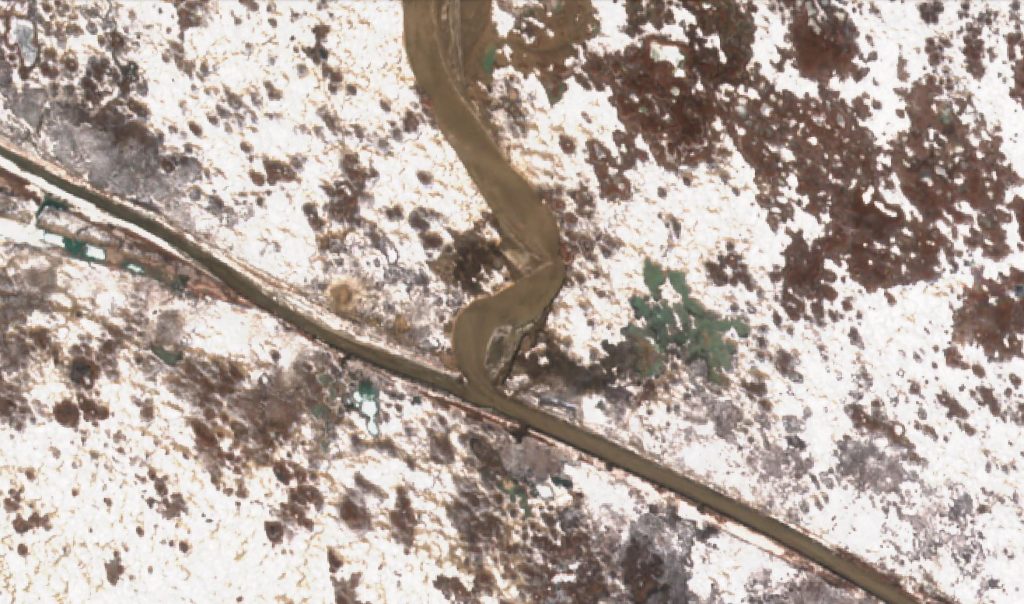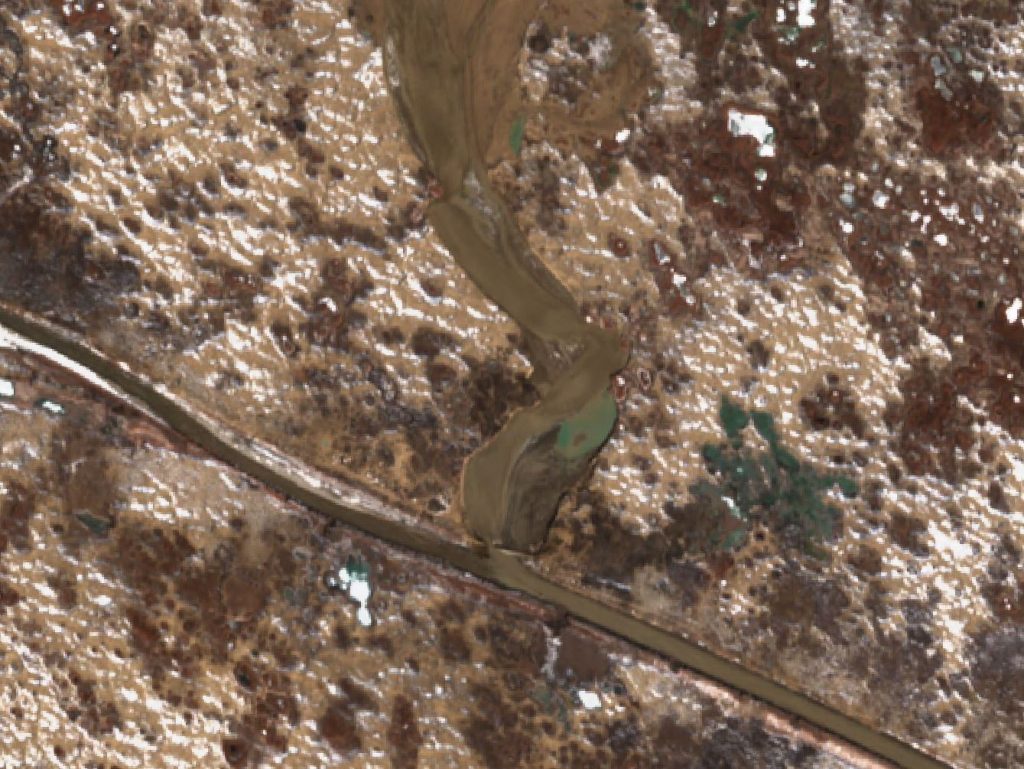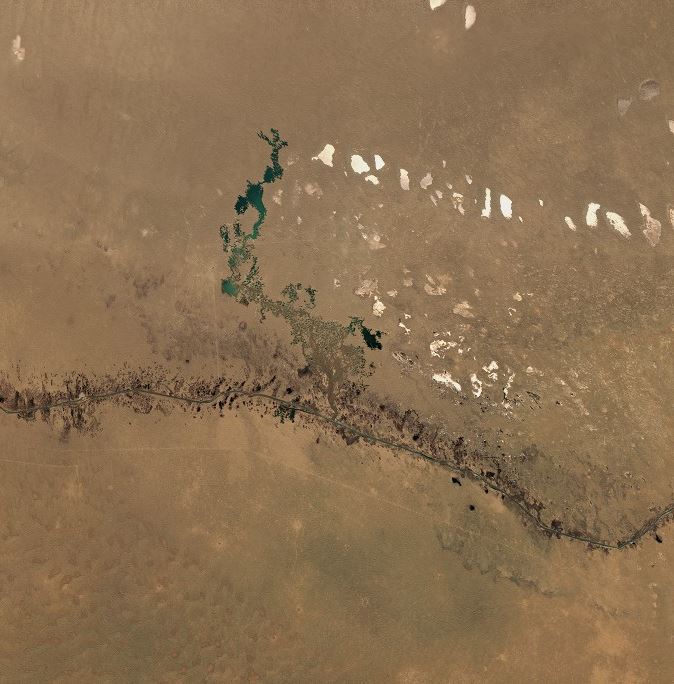
Section 5. Key water developments in the countries of Central Asia
5.4 Turkmenistan

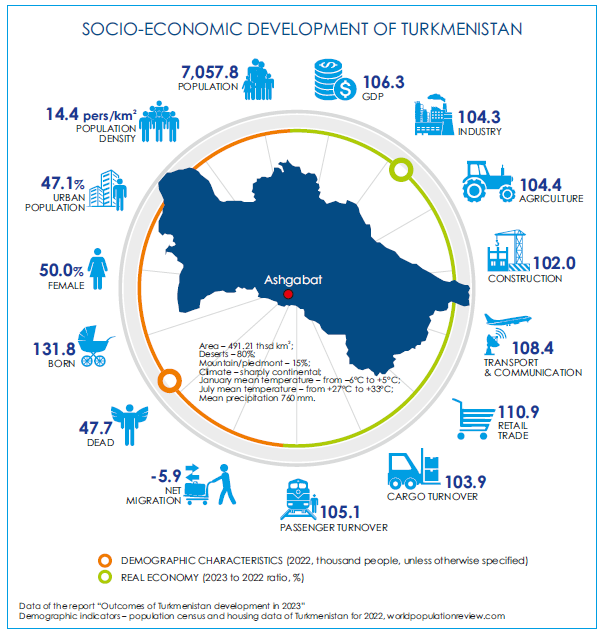
Water sector
Water resources. The water resources of Turkmenistan are comprised of the surface runoff of the Amu Darya (88%), Murgab (6.5%), Tejen (3.5%), and Atrek, Sumbar and Chandyr (1.4%) rivers, as well as the small watercourses of the northeast slopes of Copetdag (0.6%), and the insignificant amounts of groundwater resources and collector-drainage waters. All large rivers of Turkmenistan are transboundary. This means that approximately 95% of surface water originates outside the country's borders.
Latest developments in legislation. The Law of Turkmenistan "On Amending and Supplementing the Water Code of Turkmenistan", dated June 3, 2023: (1) prescribes to install modern water measurement facilities and devices at watercourses and water conduits at the expense of own funds to ensure accurate accounting of diverted water quantities (Article 41); and (2) changes the title of Article 111 to "Water pricing and tariffs" and adds the following clause: "The rules for water pricing in Turkmenistan shall be approved by the Cabinet of Ministers of Turkmenistan."
National programsм. The "Social and Economic Development Program for 2019-2025" is currently being implemented. This program prioritizes the integrated water resource management and collaboration among riparian nations. It aims to conserve water, develop new water sources, prevent soil salinization, and enhance agricultural land reclamation efforts. As part of this program: (1) a dam has been commissioned in the Gyzylarbat Etrap of the Balkan region. This dam is designed to effectively regulate the water level of the 5th aquifer at the 1002nd km of the Karakum Canal; (2) second construction phase of a 1.6 billion m3 reservoir is underway. The new reservoir is to replace the largest silted Zeyid ("15 Years of Turkmenistan's Independence") reservoir in the country. Additionally, the third phase is designed. The total reservoir system capacity will reach 3.8 billion m3; (3) in Mary province, the "Garagumderýagurlusyk" company extended the Karakum Canal's width by 173-456 km; (4) the Technology Center of Turkmenistan's Academy of Sciences developed an innovative drip irrigation injector, which saves water, and eco-granules to desalinate and improve microflora in soil; (5) production of high-tech drip irrigation systems has been launched by "Turkmen Senagat" entity.
Projects. As part of the demonstration project "Tuyamuyun Hydroelectric Complex," aimed at promoting regional water-energy cooperation at the facility level, focusing on sedimentation in the Channel Reservoir, training sessions for trainers on interactive Nexus Simulation were conducted in Turkmenistan (Ashgabat, Dashoguz, February 7 and 10). The project outcomes included the publication of Nexus Stories.
As part of the USAID Regional Water and Environment Activity, the following events were held: (1) 4th and 5th meetings of the National Intersectoral Committee (Ashgabat, February 28, September); (2) Amudarya River Day: series of events were organized to celebrate this day and included a cleanup and tree planting campaigns and an award ceremony for a children's drawing contest “Amu Darya – a river of friendship” (Dashoguz, April 27); (3) a national robust decision-making support workshop on Amu Darya River basin (Ashgabat, August 29-30); (4) a workshop on basin planning and management (Ashgabat, November 2-3).
Representatives of Turkmenistan's water sector took part in the round table "Smart Agriculture: Technologies and Benefits for Central Asia" (September 5, online), 2nd regional robust decision-support workshop on the Amu Darya basin and the 5th Regional Coordination Committee meeting (Khiva, Uzbekistan, September 25-September 26).
The FAO project "Enhancing Capacities for Climate-Resilient Water Management" was launched to study indigenous hydraulic methods, the country's irrigation and drainage system patterns, and adopted irrigation innovation methods and their effectiveness. The project's field practices will be studied in a northwestern region, where water sensors and a weather station will be installed, the inter-farm irrigation networks will be improved, and practical training will be conducted.
Capacity building. A series of seminars and meetings on water diplomacy were held at the Training Center for Priority Areas of Diplomacy at the Turkmen MFA's Institute of International Relations (Ashgabat, March 16, 20, April 4, 13, 24-26, May 11, 24, June 22).
As part of the "Embassy Science Fellows" Program, USAID in Turkmenistan and the U.S. Department of State organized a series of lectures for students and faculty of agricultural universities, as well as researchers from the "Turkmensuvylymtaslama" Design Institute. Additionally, three-week online training sessions were conducted for specialists from the State Committee for Water Resources and the Technology Center of the Academy of Sciences of Turkmenistan, focusing on water use efficiency and water desalination (September, Ashgabat).
Regional and international cooperation. The next meeting of the Joint Uzbek-Turkmen Intergovernmental Water Commission was held on April 23 in Tashkent. The meeting addressed the issues of water sharing along the Amu Darya River, automation, information sharing, and other points of concern. See Cooperation between the Countries of Central Asia on Water and Other Matters.
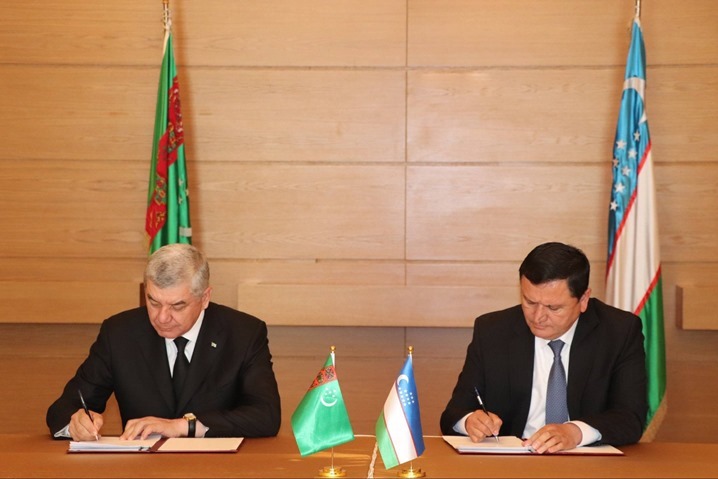
The first trilateral Summit of the Heads of State of Turkmenistan, Tajikistan, and Uzbekistan was held on August 4 in Ashgabat. As a result, a Joint Statement was adopted. This statement outlined the parties' agreement to collaborate on: joint research and development in effective water resource management, protection, and rational use; ensuring the safety of hydraulic structures, reclamation of irrigated lands; effective operation and modernization of water infrastructure; water conservation and reuse, including leveraging existing authorized regional water management organizations. See Cooperation between the Countries of Central Asia on Water and Other Matters.
The President of Turkmenistan, as part of his working visit to Tajikistan, attended the meeting of the Council of Heads of IFAS Founding States. In particular, he highlighted the need for stronger regional cooperation on environmental protection and sustainable development in Central Asia, emphasizing the Aral Sea crisis as a global priority. The President also proposed creating a Regional Center for Climate Technologies in Central Asia (Dushanbe, September 15). See International Fund for Saving the Aral Sea.
The Turkmen delegation actively participated in: (1) 84th (Dushanbe, May 10) and 85th (Tashkent, November 1-2) meetings of ICWC; (2) IFAS Board meeting (Dushanbe, June 5). Representatives of Turkmenistan's also took part in meetings of the Working Group on improvement of institutional and legal framework of IFAS. For more details, see International Fund for Saving the Aral Sea.
Events. Ashgabat hosted three important events: (1) scientific conference "Water Resource Management in the Context of Climate Change" (April 22); (2) online forum titled "Creative Ideas for Water Management for the Resilient Water Development in Central Asia" (June 5); (3) international conference on "Financial and Investment Support for Initiatives Aimed at Rational Water Use" (June 20).
Turkmen delegation participated in a number of events, including: (1) regional workshop on monitoring, assessment and information exchange in Central Asian transboundary basins (Astana, February 1-2); (2) 2023 UN Water Conference and a high-level side-event "Central Asia: Commitments to Water Action Agenda" (New York, March 22-24); (3) conference "Central Asia: Towards a Sustainable Future through Strong Regional Institution", commemorating IFAS's 30th anniversary (Dushanbe, June 5-7); (4) workshop “From Climate Modelling to River Flow: High-Resolution Scenarios and Hydrology in Central Asia's climate change context” (Tashkent, October 24-26); (5) extraordinary session of the Intergovernmental Council of the Intergovernmental Hydrological Program (Paris, November); (6) Central Asian expert meeting on rational use of water and addressing climate change (Ashgabat, December 7).
Drinking Water Supply
As part of the National Program "Village" and the "General Program for Clean Drinking Water Supply to Settlements," the construction of water treatment plants and desalination facilities are underway, existing water treatment and pipeline systems are reconstructed, and modern technologies are adopted to ensure water saving. A sewage pumping station and a water supply system connected to a 25,000 m3/day treatment plant are nearing completion in Lebap province.
In Balkan province, it is planned to modernize Jebel-Hazar pipeline, procure equipment for water supply and sanitation in Turkmenbashi and desalination units (50,000 and 70,000 m3/day) for the Avaza and Kiyanly touristic zones, and upgrade water treatment plants and water distribution station in Oglandy and Bereket settlements, respectively. In Ahal province, new "Govshut" (4.15 m3/sec) and "Yashyldep" (2.13 m3/sec) pumping stations are to be constructed in Kakkha and Ak Bugday districts.
Specialists from (1) Dashoguz Hydrogeological Field Office have studied the water quality in several settlements in Akdepe and Boldumsaz etrap; (2) Hydrogeological Field Office of the State Corporation "Turkmengeology" explore aquifers, estimate their stock, study quality and chemical composition, and assess conditions of operating wells.
Agriculture
In 2023, agricultural production growth rate showed 102.6%. Agricultural exports also rose by 10% (as compared to 2022), generating $135 million in revenue.
Latest developments in legislation. Amendments to Turkmenistan's Land Code , addressing administrative setup, were enacted on June 3, 2023.
Agricultural reformation and modernization. As part of efforts to reform the agricultural sector and enhance its efficiency, a separate Ministry of Agriculture was established on the base of the existing Ministry of Agriculture and Environmental Protection (Presidential Decree 240 of July 14, 2023). Mr. Nazarmyrat Nazarmyradov was appointed as the Minister of Agriculture. The setup of the Ministry's Central Office and the Charter were approved in August. Subsequently, the State Commission on Land Resources has been established. This Commission is responsible for rational and efficient use of land resources and regulation of land-related matters. In line with the Resolution “On establishment of research institutes at the Ministry of Agriculture”, the existing Agricultural Research and Production Center at the Turkmen Agricultural Institute will be restructured to establish the Grain Growing Research Institute, the Farming Research Institute, and the Cotton Growing Research Institute.
Implementation of national programs. Turkmenistan continues to implement: (1) the Xalq Maslahaty Resolution (of September 25, 2018) on further improvement of reforms in agricultural sector; (2) the Program of Socio-Economic Development in Turkmenistan for 2019–2025 (of February 1, 2019); (3) the Program “Revival of a new era of a powerful state: National Program for Socio-Economic Development in Turkmenistan for 2022–2052 (of February 11, 2022).
Scientists are exploring hydroponics, biological methods to boost soil fertility, combat salinity, and improve seed preparation. The new fine-fiber cotton variety "Yoleten-58," yielding 33.2 centners per hectare—2.1 centners more than standard—is being tested in Mary and Axal provinces.
The country is modernizing its agricultural sector. Agricultural clusters are established, new greenhouses are being built, while existing ones are expanded, creating jobs and providing fresh produce year-round. The recently developed Daragt app, available on Android and iOS, helps diagnose and treat plant, vegetable, and fruit diseases.
Projects. As part of the FAO/GEF project "Integrated Natural Resources Management in Drought-Prone and Salt-Affected Agricultural Production Landscapes in Central Asia and Turkey," the following activities were accomplished: a working group meeting (April); two 1-hectare nurseries were established in Baherden and Dashoguz, and a 3-hectare demonstration plot was created at the S.A. Niyazov Agricultural University (January); equipment for rapid analysis of soil, water, and plants was purchased. To supply livestock farms and population in desert communities, water infrastructure was built, including 6 wells and 6 sardobas (60 m3 each) in Baherden district, Akhal province and 2 wells and 2 sardobas in Dashoguz and Lebap provinces. Workshops were held on sustainable pasture management and preventing salinization in pilot regions (June-October).
In 2023, the Project "Conservation and Sustainable Management of Land Resources and Ecosystems in the Aral Sea Basin" (UNDP/GEF) organized in Turkmenistan: (1) roundtable discussion; (2) dialogue "The Role of Women and Girls in Combating Climate Change" (March 7); (3) practical horticulture training (March 14 and September 14); (4) workshop on water diplomacy (April 25); (5) information youth campaigns on climate for the World Day to Combat Desertification (June 17); (6) poster contest for #HerLand #HerRights campaign (June 17 – July 10); (7) capacity-building workshop on land degradation neutrality (July 27); (8) environmental quiz event for youth, co-organized by UNDP and USAID (December 2).
The FAO Project "Support for the Establishment of a Digital Land Cadastre" was launched with: (1) an inception workshop (June 6); (2) the online training on remote sensing to aid in the identification and mapping of crops (June 7–9); (3) trainings for project participants, which covered the basics of Global Navigation Satellite System technologies and their application in geodesy and cadastre, coordinate systems used in geodesy, and the main methods of conducting satellite cadastre and geodetic work (November 28–29).
Regional and international cooperation. A Turkmen delegation visited Uzbekistan to explore early and fine-fiber cotton varieties for their further cultivation in Turkmenistan and discussed cooperation in horticulture and potato seed production (January 7–14).
During President S. Berdymuhamedov's visit to Tajikistan, a "Roadmap" for enhanced agricultural cooperation for 2023–2025 was signed between the Tajik Ministry of Agriculture and the Turkmen Ministry of Agriculture and Environmental Protection (May 10–11). See Cooperation between the Countries of Central Asia on Water and Other Matters.
Meetings were held in Ashgabat between: (1) the President of Turkmenistan and the Deputy Chairman of the CIS Seed Production Council and the President of the "Seeds" Association (June 15), and the Chairman of CLAAS and the Eastern Committee of the German Economy (September 26); (2) farmers and Grimme Company's expert on potato and sugar beet cultivation (August 23–24); (3) the Halk Maslahaty Chairman and the heads of John Deere, CLAAS, and the Eastern Committee of the German Economy (September 26); (4) the Minister of Foreign Affairs and the FAO Subregional Coordinator for Central Asia (December 10).
Events. Ashgabat hosted: (1) roundtable discussion (January 20); (2) International conference "Partnership for Food Security in the context of Climate Change" (March 9–10). The Conference communiqué was published in six UN languages as an official document of the 77th UN General Assembly; (3) Conference "Opportunities of using geospatial technologies in agriculture" (November); (4) International food technology exhibition "Agro-Pak Turkmenistan–2023" (November 28–30).
Turkmen delegation took part in: (1) online meeting of Central Asian agriculture ministers on financing agriculture to boost production (February 15); (2) "GreenTech Amsterdam" exhibition (Amsterdam, June 13–15); (3) Summit "Agribusiness in Central Asia: Integration, Modernization, Success" (Issyk-Kul, Kyrgyzstan, August 27–29); (4) 2nd Meeting of Agriculture Ministers of the Organization of Turkic States and Agribusiness Forum (Baku, September 26); (5) AGRITECHNICA-2023 exhibition (Hanover, Germany, November 12–18).
Energy
The Ministry of Energy operates 12 power plants with a total capacity of 6,511.2 MW. From January to November, power generation and related services reached 112.6%. Power generation growth rates were 102.7%.
In 2023, the Gindukush Hydro Power Plant on the Murgab River celebrated its 110th anniversary . This is one of twelve largest plants. The HPP has a total capacity of 1.2 MW with three 400 kW turbines and is considered a historical structure.
Latest developments in legislation. The Law "On Renewable Energy Sources" was amended on November 25, 2023, clarifying the roles of government agencies in regulating renewable energy, in particular “State regulation in the field of renewable energy sources is under authority the Cabinet of Ministers, the Ministry of Energy, the Ministry of Agriculture, the Ministry of Environmental Protection, and local executive bodies.”
A Law "On Energy Efficiency and Energy Saving" has been drafted to create legal, economic and institutional framework for energy conservation and energy efficiency.
Mr. Annageldi Saparov was appointed as the Minister of Energy (Presidential Decree of July 14, 2023).
National strategies and programs. Turkmenistan is actively working under the "State Program on Energy Saving (2018–2024)," the "Program for Energy Diplomacy Development, 2021–2025," the "National Strategy for Renewable Energy Development until 2030," and the "Roadmap for Hydrogen Energy Cooperation, 2022–2023.”
The construction of a 1,574 MW combined-cycle power plant was launched in Turkmenbashy district, Balkan province. New gas turbines were commissioned for electricity generation at the Turkmenbashy Oil Refinery. Additionally, the Mary–Ahal transmission line was launched, connecting to the national grid via digital communication systems (November 3).
A meeting of the Inter-departmental Working Group on hydrogen energy development in Turkmenistan was held on July 11 in Ashgabat. The meeting focused on the implementation of the Roadmap for development of international cooperation in hydrogen energy in 2022–2023 and the study of international best practices in this field. Scientists from the Hydrogen Energy Center at the International University of Oil and Gas of Turkmenistan are conducting research on hydrogen fuel production.
Projects. Under the "Sustainable Energy Connectivity in Central Asia (SECCA)" project, several events were held: (1) a Steering Committee meeting (Astana, April 4); (2) a regional workshop on end energy consumption statistics (Tashkent, July 11–13); (3) a lecture was delivered for senior students of the State Energy Institute of Turkmenistan on integrated energy and climate planning, RE project cycle, and climate financing (Mary, September 12); (4) EU-Turkmenistan Sustainable Energy Days 2023 campaign, featuring conferences “Sustainable energy in Turkmenistan: prospects and challenges” (December 14) and “Energy efficiency in Turkmenistan: successes and prospects” (December 14–15) in Mary, environmental activities for schoolchildren, and an awarding ceremony for the most energy-efficient school in Mary (December 15). Lectures were also held for university staff and students of the State Energy Institute (December 15).
On December 18, SECCA key experts delivered a presentation on “Sustainable Energy Development in the Context of Global Climate Change: SECCA Project Approaches” for the students of the Institute of International Relations (IIR) under the Ministry of Foreign Affairs of Turkmenistan. A student of IIR and winner of the regional contest #Reels4SustainableEnergy was awarded a certificate (Astana).
The "Sustainable Cities in Turkmenistan: Integrated Green Urban Development in Ashgabat and Awaza" project (UNDP/GEF) held workshops in Mary: (1) “Exploring the possibilities of developing renewable energy sources in the climatic conditions of Turkmenistan. Methods of conducting an energy survey of residential and public buildings” (March 28); (2) “Studying the features of the operation of energy-saving lamps in climatic conditions of Turkmenistan. Possibility of using waste as an alternative source of energy” (May 16); (3) “Studying international experience in the development of legal framework with respect to energy conservation and energy efficiency, as well as on the solid waste management as a renewable energy resource” (September 13). Additionally, a meeting on energy-efficient practices in the hotel sector took place on October 20 in Avaza.
Capacity building. The OSCE Center in Ashgabat held online workshops on integrating renewable energy into the power grid (April 25–26) and "Energy Diplomacy Tools: OSCE Best Practices" (May 22–23).
A seminar series on "Energy Diplomacy" was ended at the Training Center of the Institute of International Relations on July 7 (Ashgabat). The Technology Center of the Academy of Sciences of Turkmenistan hosted a workshop themed "The Role of Energy in National Economy of Turkmenistan" on September 5 (Ashgabat). The State Energy Institute of Turkmenistan organized a workshop in Mary titled " Joint Efforts of UAE and Turkmenistan in Renewable Energy " on September 20.
Regional and international cooperation. National energy companies of Turkmenistan "Turkmenenergo" and Afghanistan Da Afghanistan Breshna Sherkat (DABS) have signed: (1) an agreement to extend the contract for supplies of Turkmen electricity at preferential prices in 2023 (Ashgabat, January); and (2) a protocol on the project of electricity transmission to the Nur-al-Jihad substation in Herat province (Kabul, August).
A Memorandum of Understanding on energy cooperation was signed between the State Concern “Turkmengaz” and the Abu Dhabi National Oil Company (ADNOC), along with an agreement to open and manage a correspondent account between the State Bank for Foreign Economic Affairs of Turkmenistan and First Abu Dhabi Bank (Abu Dhabi, UAE, February 12).
The Turkish company Çalık Enerji is building a modern eco-village featuring a hybrid power plant with a 7 MW solar system, two 1.5 MW wind turbines, and related facilities at Lake Altyn Asyr.
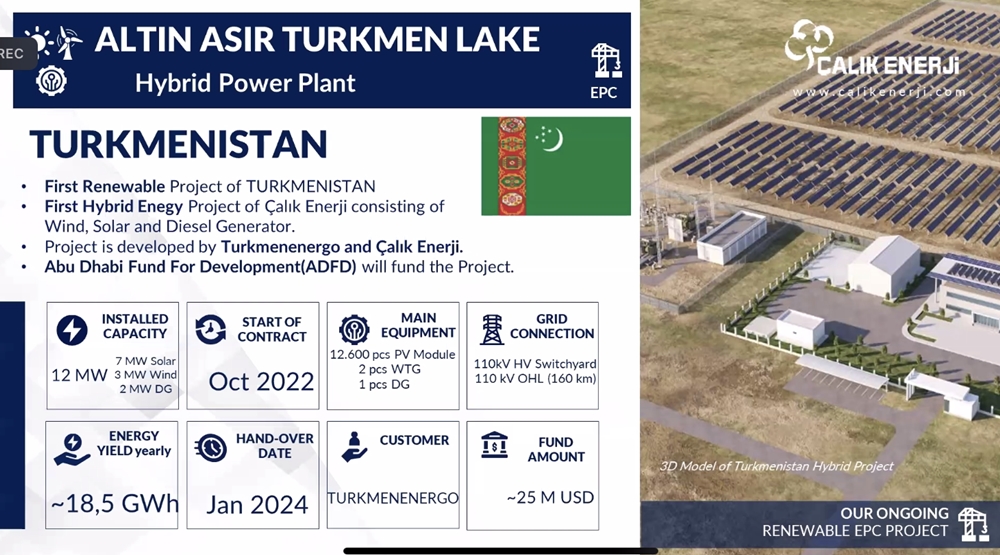
Screenshot of a slide from the Çalık Enerji presentation, source
Events. Turkmenistan initiated a resolution adopted at the 49th plenary meeting of the 78th UN General Assembly titled "The pivotal role of reliable and stable energy connectivity in driving sustainable development". The resolution calls for “…continued international cooperation in promoting reliable and stable energy connectivity at the national, regional and global levels, … efforts for resilient and secure cross-border energy infrastructure and energy connectivity …” The document also proposes to hold an international meeting of experts early in 2024 in Turkmenistan to discuss strategies and foster collaboration on enhancing energy connectivity and the Sustainable Energy for All Forum in 2026 (New York, December 19).
In the course of the year, several events were held, including: (1) international scientific-practical conference "Scientific and Technical Opportunities for Producing Hydrogen Energy from Natural Gas" (Ashgabat, February 24); (2) international forum "Turkmenistan's Role in the Future of Global Energy" (Dubai, April 26–27); (3) scientific-practical conference "Energy Prospects and New Technologies for Hydrocarbon Field Development" (Ashgabat, June 15); (4) 28th International Conference and Exhibition "Oil and Gas of Turkmenistan–2023" (Ashgabat, October 24–27).
The Turkmen delegation participated in several international events, including: (1) 15th Caspian Energy Forum (Moscow, April 20); (2) conference on energy security and sustainable development in Central Asia (Brussels, July 4); (3) first meeting of the ministerial economic and energy dialogue under the "Central Asia + Japan" framework (September 26, online); (4) ADIPEC 2023 exhibition, during which discussions were held with Pakistan's Acting Federal Minister for Energy, focusing on implementation of the TAPI project (Abu Dhabi, October 2-5).
Environment and Climate Change
Government reformя. On July 14, 2023, the Ministry of Environmental Protection was established on the base of the Ministry of Agriculture and Environmental Protection (Presidential Decree No. 240 of 14.07.2023). Mr. Charygeldi Babanyazov was appointed as Minister. The new Ministry's setup and charter were approved on August 1, 2023.
National strategies and programs. Turkmenistan is implementing its National Strategy on Climate Change, with some actions set in the Strategy included in sectoral programs and socio-economic plans. Several programs are underway: (1) National Forestry Program, 2021–2025 (approved in 2021). A resolution provided for planting deciduous, coniferous, fruit trees and grapes in 2023; afforestation campaigns were undertaken, and a roundtable , which launched a guidelines on growing orchards and forests in Turkmenistan, was held; (2) National Program on the Aral Sea for 2021–2025. It is planned to build a 90 million m3 reservoir on the Turkmenderýa Canal and coat over 100 km of the Şasenem Canal; (3) Concept for development of the Lake Altin Asyr area in 2019–2025 (approved in on April 12, 2019) focuses on building a modern eco-village in the region.

Screenshot of a slide from the Calık Enerji presentation, source
Projects. As part of the project "Developing a National Adaptation Planning Process in Turkmenistan" (UNDP/GCF), multiple events were organized, including: (1) a series of trainings on climate adaptation and water, transboundary cooperation (June 13–14, July 11–12, September 12–14, September 19–21, November 13–15, and November 16–17); (2) roundtables in Ashgabat on establishment of a coordination mechanism for intersectoral adaptation planning (April 14) and on approachs for the development of the monitoring and evaluation system for measuring the climate change adaptation efforts (November 23); (3) meetings with experts from the Austrian company Hydrophil GmbH to discuss challenges related to climate change (Ashgabat and Dashoguz province, November 27–December 6); (4) trainings review institutional and practical aspects of climate change adaptation at different levels of management and their integration into the national adaptation planning process (Ashgabat, February 21–22, May 30–31).
The "Sustainable Cities in Turkmenistan: Integrated Green Urban Development in Ashgabat and Awaza" Project (GEF/UNDP) organized: (1) a dialogue on the role of women and girls in climate actionы (Ashgabat, March 7); (2) a working meeting (Ashgabat, April 12); (3) series of events on occasion of the World Environment Day (Balkan region, June 5).
As part of the "Regional Climate Action Transparency Hub for Central Asia" Project (ReCATH/ICAT), Turkmenistan representatives joined: (1) regional training sessions on greenhouse gas inventory tools (Tashkent, February 27–March 3) and improvement of data collection and analytical tools for forecasting greenhouse gas emissions in Central Asian countries (Dushanbe, May 18–19); (2) first meeting of the Technical Working Group on Transparency in Adaptation to Climate Change in Central Asia (Bishkek, July 13–14); (3) regional training on climate action transparency (Ashgabat, October 9–12); (4) side event at COP28 (Dubai, December 3).
Capacity building. The Ministry of Education and the National Institute of Education of Turkmenistan, in partnership with UNICEF, developed and distributed new methodological manuals on climate adaptation for secondary school teachers.
In 2023, the Turkmen State Pedagogical Institute named after S. Seydi established a UNESCO Chair on "Environmental Education for Sustainable Development." The Turkmen Agricultural Institute in Dashoguz also launched a UNESCO Club titled "Environmental Protection – Key Concept of Sustainable Development."
The Innovative Scientific and Educational Center of the International University of Oil and Gas has got a license for environmental activities, including development of ecological passports, technology regulations, technical specifications, and state standards for new products.
Regional and international cooperation. The Turkmen delegation participated in the 3rd Meeting of the ICSD Advisory Council (Astana, September 4-5). See ICSD of Central Asia.
As part of German Initiative "Green Central Asia", experts from Turkmenistan took part in: (1) a workshop on the Droughtmap ASB tool (Tashkent, May 3-5); (2) a subregional workshop on mine tailings safety and the prevention of accidental water pollution in Central Asia (Dushanbe, May 25-26); (3) 4th regional inter-governmental working group meeting on the Regional Climate Change Adaptation Strategy in Central Asia (Almaty, July 4-5).
UNDP and the British Embassy in Turkmenistan hosted the 6th Coordination Meeting of the Climate Development Partners Group in Ashgabat on September 15. Discussions covered preparations for COP28, progress on Turkmenistan's 4th National Communication (NC4 ) on Climate Change to the UNFCCC, and the development of a National Greenhouse Gas Inventory System, as part of the country's Nationally Determined Contribution submitted in 2022.
The Ministry of Environmental Protection signed Memoranda of Understanding with: (1) International Union for Conservation of Nature (IUCN), to enhance cooperation in policy management, biodiversity protection, and related areas (November 10); (2) UNEP, outlining activities for exchanging information on innovative climate technologies and solutions (November 13).
Several important meetings took place between: (1) the President of Turkmenistan and the U.S. Special Presidential Envoy for Climate (New York, September 19); (2) the Foreign Minister and the UNEP Executive Director Inger Andersen (January 16), GGGI Director-General Frank Rijsberman, who proposed signing a "Host Country Agreement" and establishing a GGGI office in Turkmenistan (February 23), Head of Iran's Environmental Protection Organization Ali Salajegheh (March 10); (3) the Turkmenistan's Permanent Representative to the UN, Aksoltan Ataeva and the UN Deputy Secretary-General and ESCAP Executive Secretary Armida Salsiah Alisjahbana (July 12).
The OSCE Center in Ashgabat organized seminars on the procedures and protocols under the Espoo Convention (April 27–28, online) and on monitoring and scientific research on the reduction of methane emissions (Ashgabat, November 6–7). Additionally, a training course on the production of TV programmes covering environmental issues for media professionals was held on October 10–13 in Ashgabat.
Youth delegates from Turkmenistan participated in the Central Asian Youth Environmental Camp held from October 1-5 in Samarkand, Uzbekistan.
Events. Many important events were organized in Turkmenistan, including: (1) roundtable for government institutions, civil society, and private companies to discuss and draft regulations to the 2019 Law on Environmental Audit (January 18); (2) tree-planting campaign (March 18); (3) eco-festival in honor of Earth Day (April 22); (4) scientific-practical conference on environmental achievements and international cooperation (May 5 and June 5,); (5) roundtable on "green" economy and digital transformation (May 11); (6) competition on "Environmental Protection and Culture" for 10th- and 11th-grade students (May 17); (7) international conference titled "Arkadag City – An Environmentally Friendly Land of Beautiful Nature" (July 3); (8) youth conference on climate change (October 3); (9) regional conference on the role of youth in addressing climate issues (November 21); (10) roundtable on approaches to combating desertification and land degradation, featuring expertise from the National Institute of Deserts, Flora, and Fauna (NIDFF, Turkmenistan) and the Kostyakov All-Russian Research Institute of Hydraulic Engineering and Melioration (November).
Turkmen delegation took part in key international events, including, among many others: (1) 7th High-Level Conference "EU–Central Asia" on Environment and Water Resources (Rome, February 23–24); (2) UNGA High-Level Meeting on the transition to zero waste (New York, March 29–31); (3) 9th Meeting of Foreign Ministers and Parliamentarians of Central Asian Countries on Climate Change (Tashkent, April 19); (4) 79th ESCAP session (Bangkok, May 15–19); (5) 5th Central Asian Climate Change Conference (Dushanbe, May 16–17); (6) 10th Nevsky International Ecological Congress (St. Petersburg, May 26); (7) International Conference "Central Asia: Towards Sustainable Future through Strong Regional Institution" (Dushanbe, June 5–7); (8) 7th Ministerial Conference on Environment and Health (Budapest, July 5–7); (9) OSCE High-level Conference on Climate Change (Vienna, July 7); (10) 1st International Conference on Enhancing Expert Services for Environmental Issues in Central Asia (Almaty, September 25–26).
At Turkmenistan's initiative, 79th ESCAP session unanimously adopted a resolution on “Consideration of the modalities for the establishment of the United Nations special programme for the Aral Sea basin” . The resolution highlights the need for regional and international cooperation to address and minimize disasters in the basin and proposes to carry out a study on the necessity, viability and modalities of establishing the United Nations special programme for the Aral Sea basin (Bangkok, May 15–19).
The desert ecosystems of Turkmenistan—Bereketli Garagum, Gaplangyr, Repetek, and Yerajy—were formally inscribed on the UNESCO World Heritage List as components of the transnational serial nomination "Cold Winter Deserts of Turan" during the 45th session of the World Heritage Committee (Riyadh, September 20).
During his speech at COP28, the President of Turkmenistan: (1) announced the country's accession to the Global Methane Pledge; (2) highlighted the importance of the recently signed Memorandum of Understanding between the Ministry of Environmental Protection of Turkmenistan and UNEP; (3) welcomed the proposed Declaration on Climate and Health; (4) expressed full support for the Emirates Declaration on Sustainable Agriculture, Resilient Food Systems, and Climate Action and stated Turkmenistan's readiness to back the initiative for establishing the COP-28 Coalition for High Ambition Multilevel Partnerships for Climate Actions. he President emphasized Turkmenistan's commitment to fostering regional and global cooperation in areas such as agriculture, ecology, energy, finance, and health, aligning with the objectives of the Emirati Declaration while safeguarding national interests (December 1-2).
Emergencies
Turkmenistan is making progress in strengthening its capacity for disaster risk management and fulfilling its obligations under the Sendai Framework for Disaster Risk Reduction 2015-2030. Speaking at the recent Meeting of the Heads of Emergency Agencies of Central Asia, the head of Turkmenistan's delegation noted that the Regional Forum is an effective mechanism for strengthening international and regional cooperation in disaster risk reduction and contributes to the emergence of regional initiatives in the field of climate change adaptation, prevention, and response to emergencies (Almaty, November 10).
Breach of the Karakum Canal. In January, ice jams caused by unusually severe frosts, combined with the unique features of the terrain, led to a breach in the Karakum Canal. As a result, a significant portion of water was diverted into the desert. This caused flooding in some settlements, while leaving others, conversely, without water.
For more than 15 days, a substantial amount of water from the Karakum Canal flowed into the desert, spreading over 35 kilometers into the sands. At the breach site, the water split into smaller streams, creating thousands of small lakes among the dunes and larger lakes on flat areas such as takyrs and salt marshes. By February 11, the largest lake formed covered approximately 10 square kilometers. The image shows that the dam has been fully repaired, the breach sealed, and the flow of water into the desert halted.
Drought. Since late 2022, a lack of rainfall in parts of the Dashoguz, Balkan, and Ahal provinces, coupled with unusually warm weather in March and April, has led to drought conditions across much of the country. By May, water levels in reservoirs along the Karakum Canal, including the Hauzhan and Kopetdag reservoirs, had dropped significantly. As of May 25, 2023, the Hauzhan Reservoir covered an area of 75.4 km2, nearly half its size during the same period in the dry year of 2021, when it measured 135.5 km2.
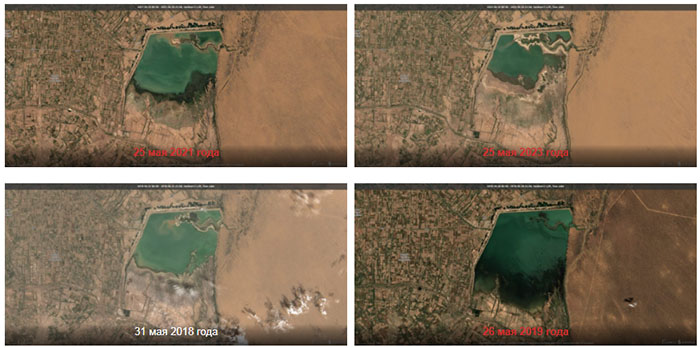
Hauzhan Reservoir Source
The water surface area of the Kopetdag Reservoir decreased from 25.5 km2 to 17.7 km2 between April 26 and May 25, 2023, a reduction of 7.8 km2 or 30.6%. Along with the previously mentioned factors, the breach in the Karakum Canal is likely another contributing cause of the reservoir's depletion.
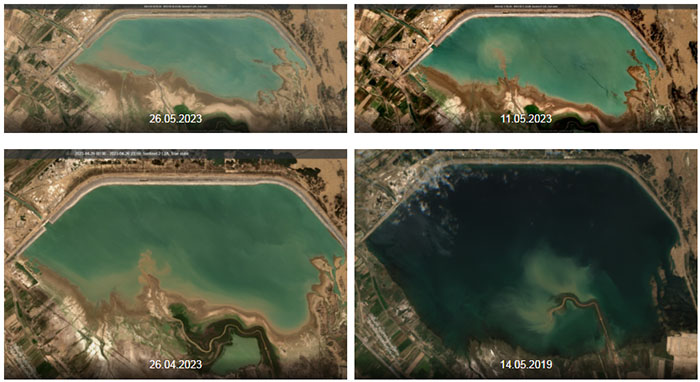
Kopetdag Reservoir Source
Low water levels were also observed in the reservoirs of the transboundary Tuyamuyun hydrocomplex. By the second half of May, the water volume had dropped to 2.3 km3.

Reservoirs of the Tuyamuyun Hydrocomplex Source
Projects. As part of the program "Strengthening Local and National Capacities for Emergency Preparedness and Response in High Earthquake and Natural hazard prone Countries of Central Asia" (USAID), the following events were held: (1) series of capacity-building events on emergency preparedness, involving 10 target schools and over 300 staff members and volunteers from the National Red Crescent Society of Turkmenistan in Ashgabat, Ahal, Lebap, and Dashoguz regions; (2) regional training on disaster preparedness (Almaty, July 19–21).
The regional project "Climate Risk Management in Central Asia" (GIZ) has been launched. Specialists from Turkmenistan took part in the kick-off meeting of the Steering Committee (Tashkent, June 13-14) and a study tour to Germany (Bonn, December 3-8).
Capacity building. The UNDP office in Turkmenistan organized a national training on post-disaster recovery planning and needs assessment (Ashgabat, April 11–12). Experts from Turkmenistan also participated in an online CIS emergency notification drill for natural and man-made disasters, conducted by the Ministry of Emergency Situations of Belarus (July 31).
SDG in Turkmenistanе
Turkmenistan continued working on the Sustainable Development Cooperation Framework between United Nations and the Government of Turkmenistan, 2021–2025. Meetings of the Joint Steering Committee focused on safety, environmental protection, and food security (Ashgabat, April 20 and December 14).
The Government of Turkmenistan and the UN held the 7th meeting of the Joint expert group on SDGs financing. The participants outlined a roadmap on the basis of the Development Finance Assessment report, reviewed a step-by-step guidance on the development of financial strategies of the Integrated National Financing Framework, possible SDG accelerators (Ashgabat, May 8).
At the High-Level Political Forum on Sustainable Development, Turkmenistan presented its second Voluntary National Review (VNR). It covered progress on SDGs set before the country by 2030, COVID-19 response, strategic policy documents, and six extra goals for Turkmenistan (healthcare, inclusive education, food security, gender equality, improved well-being, and environmental protection) (New York, July 10–19).
Progress on the SDGs in Turkmenistan was discussed at a roundtable of the National Working Group on the Implementation of the SDGs (Ashgabat, August 25).
Turkmenistan ranked 91st out of 166 countries in the annual Sustainable Development Goals Index published by the UN and the Bertelsmann Foundation.


Projects. As part of the project "Partnering for SDG acceleration, phase II" (UNDP): (1) technical assistance was provided in the preparation of the second Voluntary National Review (VNR) and to the State Committee of Turkmenistan on Statistics in the development of an online national SDG reporting platform ; (2) a webinar on "Formation of indicators of the State budget with reference to the SDGs" (May 31, online) and a workshop on establishing a Regional Sustainable Development Goals (SDGs) Information Platform for Central Asian countries (November 6-10, Ashgabat) were held.
As part of "Young SDG Ambassadors" project (UNDP), the Ambassadors took part in: (1) a meeting on the SDGs (Ashgabat, January 25); (2) 2nd International Conference and Exhibition "International Transport and Transit Corridors: Interconnection and Development - 2023" (Ashgabat, May 3); (3) panel discussion "Affordable and Clean Energy from a Youth Perspective" (Ashgabat, June 14); (4) youth conference on climate change (Dashoguz, October 3). A tree-planting campaign was also held (April 20, Ashgabat).
Capacity building. To raise awareness among youth about SDGs, the following events were held: (1) meetings by UNDP specialists with students of various universities in the country, where such issues as the role of the younger generation in combating the climate crisis, Turkmenistan's international climate initiatives, etc. were discussed (May, June, Ashgabat); (2) an introductory workshop on the assessment and strategic planning of the SDG process (November, Ashgabat).
Events. Ashgabat hosted: (1) international scientific-practical conference "Sustainable Development Goals: Youth Policy and Innovative Technologies" (February 15); (2) roundtable on SDG implementation at the Institute of International Relations (March 20); (3) youth conference at the UNDP office (April 4–5), (4) training on SDGs (April 17).
Turkmen delegation attended the 10th Asia-Pacific Forum on Sustainable Development (Bangkok, March 27–30), the High-Level Political Forum on Sustainable Development (New York, July 10–20), and the SDG Summit (New York, September 19–20).
Cooperation on the Caspian Seaю
Throughout the year, the Inter-ministerial Commission of Turkmenistan on the Caspian Sea had meetings to review its activities in 2022 and set plans for 2023, discuss outcomes of the 6th Caspian Summit, and evaluate the implementation of decisions and agreements made during the meeting of the heads of the Caspian states. Other topics included preparations for events marking the Day of the Caspian Sea and other related activities (Ashgabat, February 1, July 29, August 30).
The Ministry of Foreign Affairs of Turkmenistan hosted the sixth meeting of the High-Level Working Group on Caspian Sea Issues. Discussions continued on a draft agreement regarding the method for establishing baselines in the Caspian Sea, with several provisions agreed upon. The meeting concluded with the adoption of a communiqué (September 11–13, Ashgabat).
The International Seaport in Turkmenbashi has been awarded the EcoPorts certificate, granting it the status of a green port integrated into Europe's transport system. The port features carbon protection measures, uses electric cranes, adheres to waste management regulations, and implements innovative technologies to minimize environmental impact.
Fluctuations of the sea level. The Caspian Sea's water level continues to decline, significantly impacting biodiversity and other environmental factors. The primary causes are climate change, reduced river inflows, and increased evaporation rates. As of January 2023, the sea level was approximately 30 cm lower than it was in January 2022.
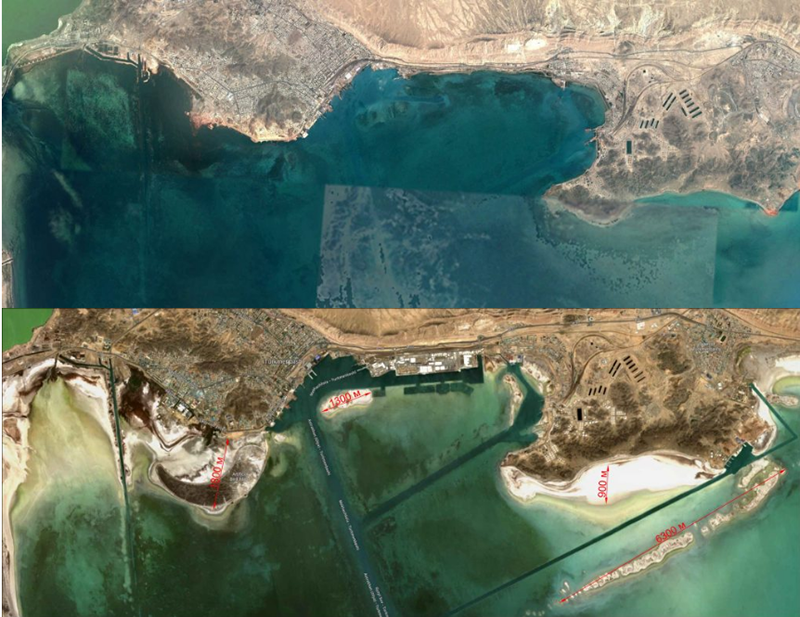
Images of the coastline near the city of Turkmenbashi in 2004 and 2023 Source

Turkmenbashi in 2004 and 2023 Source
As a result of the declining sea level, the northeastern part of Turkmenbashi Bay has completely vanished. Over the past six years, the shoreline has receded by 12 kilometers, with the sea level dropping by 71 cm since 2017 and 145 cm since 2011.
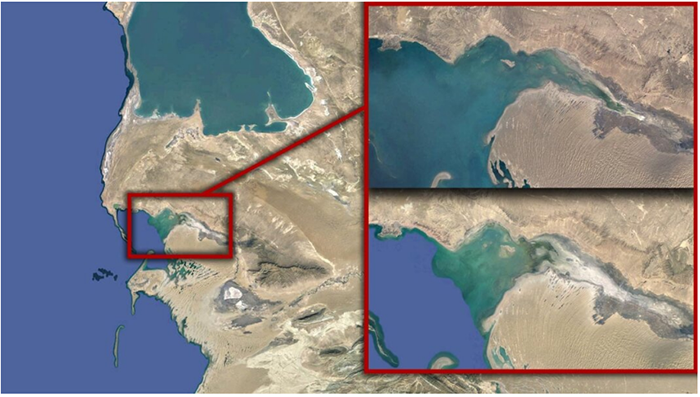
Northeastern part of Turkmenbashi Bayи Source
Events. Turkmenistan hosted: (1) a scientific-practical conference "Caspian Sea – the sea of peace and friendship" and an exhibition (August 12); (2) 9th training course "Caspian Sea – Sustainable Development and Management," during which a Memorandum of Understanding and Cooperation was signed between the Caspian Sea Institute and the International Ocean Institute (September 11–20); (3) online five-party expert consultations on finalizing the draft intergovernmental agreement on research cooperation on the Caspian Sea (October 30).
At the 78th session of the UN General Assembly, the President of Turkmenistan proposed creating the "Caspian Environmental Initiative" as an international platform to address the protection of the Caspian Sea, its biological resources, and key environmental issues (New York, September 19).
Turkmen delegation participated in multiple events, including: (1) 15th Caspian Energy Forum (Moscow, April 20); (2) international forum "Transport Logistics of the Caspian Sea Region 2023" (Astrakhan, Russia, April 26–27); (3) 1st Caspian Scientific and Educational Congress (Astrakhan, Russia, May 29); (4) Forum "Caspian Sea 2023: Paths to Sustainable Development" (Astrakhan, Russia, May 30–31); (5) 32nd session of the UNESCO's Intergovernmental Oceanographic Commission (Paris, June 21–30); (6) Caspian Media Forum (Astrakhan, Russia, September 18–19); (7) Ministerial consultations under the Framework Convention for the Protection of the Marine Environment of the Caspian Sea (Geneva, Switzerland, September 21–22); (8) 9th conference "Preserving the Caspian Ecosystem amid Oil and Gas Development" (Astrakhan, Russia, November 10); (9) Meeting of Foreign Ministers of the five Caspian states (Moscow, December 5); (10) meeting of the Ad Hoc Expert Group on the organization of the Secretariat of the Framework Convention (Baku, December 18–19).
Regional and international cooperation. A Memorandum of Understanding was signed between Russia's Federal Fisheries Agency and Turkmenistan's Ministry of Finance and Economy, establishing a foundation for bilateral cooperation in fisheries. The focus is on managing shared marine biological resources in the Caspian Sea (Ashgabat, January 20). A regular meeting of the Joint Working Group on the delimitation of the bottom of the Caspian Sea between the Republic of Azerbaijan and Turkmenistan was held. Discussions on the provisions of the draft agreement between the two countries were continued (Ashgabat, January 24–25).
Foreign Policy and International Cooperation
During 2023, the President of Turkmenistan paid state, official, and working visits to a number of countries, including China (January, May), Bahrain (February), Azerbaijan (March), Qatar (March), Russia (May), Tajikistan (May, September), the United Kingdom (May), Turkey (June, October), Saudi Arabia (July), Hungary (August), the United States (September), Kyrgyzstan (October), Uzbekistan (November), and the United Arab Emirates (December).
Key developments in the foreign policy of Turkmenistan
Turkmenistan continues to pursue its foreign policy strategy as outlined in the Concept of Turkmenistan's Foreign Policy for 2022–2028 . This strategy focuses on ensuring peace and security at both the regional and global levels, maintaining the country's permanent neutrality, and enhancing cooperation in areas such as diplomacy, trade, culture, energy, transport, and environmental issues.
Turkmenistan initiated a UNGA resolution to declare 2023 the International Year of Dialogue as a Guarantee of Peace. The Strategy for International Cooperation of the Youth of Turkmenistan, 2023–2030 has been adopted.
Related events hosted in Turkmenistan included: (1) international conference "The Role of Neutral States in Strengthening Security, Stability and Dialogue in the OSCE Region", bringing together parliamentarians of CA countries, Eastern and Western Europe, diplomatic missions, academia and media (Ashgabat, May 16); (2) international youth forum "Dialogue as a Guarantee of Peace" , which discussed topics like climate change, digital diplomacy, and youth initiatives, along with the first meeting "Dialogue of Youth from the Central Asian Countries" (Arkadag, October 2); (3) Cooperation Forum "Central Asia – Republic of Korea", focusing on regional issues, youth policies, and joint initiatives for international cooperation and achieving SDGs (Ashgabat, November 1).
Development of alliances and strategic partnerships. Ties are expanding and comprehensive cooperation between Turkmenistan and the countries of Central Asia and the CIS is strengthening.
During the official visit of the President S. Berdymukhamedov to Tajikistan, 23 documents on bilateral cooperation were signed, and a wide range of current regional and international issues were discussed (May 10-11). In the run-up to the visit to Dushanbe, a joint Turkmen-Tajik business forum (May 8) and a round table "Development of scientific and technical cooperation between research institutions of Tajikistan and Turkmenistan: challenges and prospects" (May 8) were held. See Cooperation between the Countries of Central Asia on Water and Other Matters.
The matters related to rational use of water resources of the Amu Darya River, development of cooperation in the area of energy, transport, logistics, etc. were discussed at the first trilateral Summit of the Presidents of Turkmenistan, Tajikistan, and Uzbekistan. A Joint Statement was adopted following the summit (Ashgabat, August 4). See Cooperation between the Countries of Central Asia on Water and Other Matters.
Turkmenistan, as an associate member of the CIS, participated in the following CIS meetings: (1) Council of Heads of State (Bishkek, October 13); (2) Council of Heads of Government (Sochi, Russia, June 8; Bishkek, October 26; Moscow, December 18); (3) Council of Foreign Ministers (Samarkand, Uzbekistan, April 14; Bishkek, October 12); (4) Economic Council (Moscow, March 17; June 23, online; September 22, online; Moscow, December 8), as well as in the informal Summit of Heads of State (Saint Petersburg, Russia, December 26).
In the capacity of an honorary guest of the Shanghai Cooperation Organization (SCO), the President of Turkmenistan participated in the meeting of the Council of SCO Heads of States (July 4, online). Turkmen delegation attended also the 22nd Meeting of the Council of SCO Heads of Governments (Bishkek, October 26).
As part of its regional cooperation efforts, the delegation of Turkmenistan participated in important events, including: (1) Expert Meeting "Central Asia – 2030: Visions of the Future" (Astana, January 20); (2) First Inter-Parliamentary Forum of Central Asian States, resulting in the adoption of the Turkistan Declaration (Turkistan, February 9–10); (3) 6th Ministerial Meeting in the "Central Asia – Russia" format (Samarkand, Uzbekistan April 14); (4) 4th Meeting of Foreign Ministers in the "Central Asia – China" format (Xi'an, China, April 27); (5) XIV Kazan International Economic Forum "Russia – Islamic World: Kazan Forum 2023" (Kazan, Russia, May 18–20); (6) XVI Forum of Creative and Scientific Intelligentsia of CIS Countries (Bishkek, September 12–13); (7) First Meeting of Transport Ministers of Central Asian states (Dushanbe, September 13); (8) Meeting of Foreign Ministers of Central Asian countries (Dushanbe, September 13); (9) 5th Consultative Meeting of the Heads of Central Asian States (Dushanbe, September 14); (10) Meeting of the Council of Heads of IFAS Founding States (Dushanbe, September 15); (11) Economic Forum of Central Asian States "Digital Economy, E-Commerce, and Innovation" (Dushanbe, September 14); (12) 13th Meeting of Deputy Ministers of Central Asian States (Bishkek, November 27–28).
Turkmenistan has joined to the Basic Multilateral Agreement on International Transport for the development of the Europe-the Caucasus-Asia corridor (November 14).
Promotion of the national interests and reinforcement of the country's image
Turkmenistan actively cooperates with the UN, EU, OSCE, OIC, ECO, and other organizations.
United Nations. At Turkmenistan's initiative, the UN adopted the following resolutions in 2023: (1) A/77/L.53 "Role of the United Nations Regional Centre for Preventive Diplomacy for Central Asia" (February 17); (2) A/RES/78/148 "Strengthening the links between all modes of transport to achieve the Sustainable Development Goals" (December 19); (3) A/RES/78/149 "The pivotal role of reliable and stable energy connectivity in driving sustainable development" (December 21).
The following final documents of international conferences held in Ashgabat were published as official documents of the 77th session of the UN General Assembly: (1) Final declaration of the first ministerial meeting of the Group of Friends of Neutrality for Peace, Security and Sustainable Development, A/77/778 (December 10, 2022); (2) Communiqué of the international conference on cooperation on food security in the context of climate change, A/77/837 (March 9–10); (3) Summary statement of the participants of the international conference on international transport and transit corridors: interconnectedness and development 2023, A/77/899 (May 3–4); (4) Outcome statement of the Central Asian regional conference on the role of neutral States in strengthening security, stability and dialogue in the Organization for Security and Cooperation in Europe region, A/77/909 (May 16).
UNGA at the initiative of Turkmenistan, resolution A/77/L.67, declared November 26 as the World Sustainable Transport Day (May 16). The head of state addressed the 78th session of the UN General Assembly, where he emphasized the importance of tackling climate and environmental challenges (September 19).
Turkmenistan works actively with the UN specialized agencies. On February 27, the ceremony of signing documents between the ministries, state agencies, public organizations of Turkmenistan and the representative offices of the structural divisions of the United Nations in Turkmenistan - UNDP, UNFPA, UNICEF was held in Ashgabat. In 2023, Turkmenistan was elected to the Executive Board of UNICEF for 2024–2026 (April 5) and to the ECOSOC Commission on Population and Development for 2024–2028 (December 5). Some of events that took place in 2023 included: (1) a meeting with UNESCO Cluster Office Director, Golda El-Khoury, to discuss including Turkmen cultural heritage in the UNESCO World Heritage List (May 15); (2) the ceremony of signing a Roadmap for cooperation between the Ministry of Education of Turkmenistan and UNESCO's Institute for Information Technologies in Education for 2024–2025 (November 9); (3) a conference "Turkmenistan – UNESCO: Cooperation for Prosperity" (August 17).
Turkmenistan took part in: Ministerial Meeting of SPECA Member States (Geneva, Switzerland, April 17); 70th Session of the UN Economic Commission for Europe (UNECE) dedicated to digital and "green" transformation (Geneva, Switzerland, April 18–19); First Summit of Heads of State and Government of SPECA Member Countries (Baku, November 24).
As part of work within the Economic Cooperation Organization (ECO), the Minister of Foreign Affairs participated in the 26th Meeting of the Council of Foreign Ministers of ECO Member States. The parties addressed such issues as enhancing regional cooperation in the area of investments, green economy, energy, food security, environment, agriculture, digitalization, and transport (Tashkent, January 24). The President of Turkmenistan attended the 16th ECO Summit (Tashkent, November 9).
European Union. The 22nd annual meeting of the joint Turkmenistan-European Union committee was held and focused on bilateral agenda issues and the implementation of the EU Strategy for Central Asia (Brussels, December 19). Key meetings included: (1) discussion with a delegation led by the EU Special Representative for Central Asia, Ambassador Terhi Hakala (April 20); (2) meeting of Special Representatives for Afghanistan in the "EU-Central Asia" format, which concluded with a Joint Statement (May 26); (3) meeting between the President of Turkmenistan and the President of the European Council (New York, September 18). A press conference marking the 30th anniversary of the Turkmenistan-EU partnership was organized in Ashgabat (November 22).
OSCE. A new office of OSCE Center was opened in Ashgabat (June 1). Meetings were held with the President of the OSCE Parliamentary Assembly, Margareta Cederfelt (May 16) and with the OSCE Secretary General, Helga Schmid (June 1). The discussions focused on the current state and future development of Turkmenistan's cooperation with the OSCE, particularly in political and economic spheres, energy and environmental security, and the promotion of parliamentary diplomacy. A meeting between the foreign ministers of Central Asian countries and the OSCE Secretary General took place on October 31.
Turkmen delegation took part in multiple international events, including: (1) meeting of the heads of foreign ministries of the countries of Central Asia and the United States in the «C5 + 1» format (Astana, February 28); (2) meeting of the Council of Foreign Ministers of the Organization of Islamic Cooperation (OIC) (Nouakchott, Mauritania, March 16–17); (3) First Central Asia–China Summit (Xi'an, China, May 18–19); (4) High-Level Summit in the Central Asia–EU format (Cholpon-Ata, Kyrgyzstan, June 2); (5) first High-Level Meeting of Central Asia–US ("C5+1") (New York, September 19); (6) first meeting of Speakers of Parliaments of Central Asia and the Republic of Korea "Development of mutually beneficial relations focused on the future" (Seoul, September 19); (7) meeting of heads of delegations in the «Central Asia + Germany» format (Berlin, September 29); (8) Belt and Road Forum (Beijing, October 17–18); (9) 19th ministerial meeting “Central Asia - European Union” (Luxembourg, October 22–23); (10) meeting of foreign ministers of Central Asia and G7 (November 8, online).
Sources:
The official web-sites of: Ministry of Foreign Affairs of Turkmenistan, Permanent Mission of Turkmenistan to the UN, State Committee for Water Management of Turkmenistan, Ministry of Justice of Turkmenistan, Ministry of Energy of Turkmenistan, Ministry of Economy and Finance of Turkmenistanа, Academy of Sciences of Turkmenistan.
Information agencies: turkmenistan.gov.tm, tdh.gov.tm, turkmenportal.com, oilgas.gov.tm, orient.tm, arzuw.news, www.parahat.info ashgabat.in
